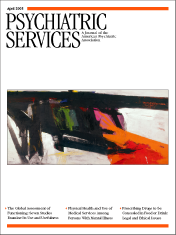Accumulating evidence supports the importance of psychotherapy as a fundamental part of psychiatric care. Combining psychotherapy and psychopharmacology often enhances compliance and effectiveness (
1). The well-trained psychiatrist should be competent in both treatment modalities and be able to deliver both, either as an integrated whole or as a subset of responsibilities divided between two professionals in a team.
Integrating Psychotherapy and Pharmacotherapy: Dissolving the Mind-Brain Barrier addresses many aspects of that clinical challenge.
The book is an outgrowth of the American Psychiatric Association's commission on psychotherapy by psychiatrists, established in 1996 to reaffirm and support the psychotherapeutic part of the identity of the psychiatrist. One fundamental strategy of the commission was to bring together psychiatric leaders in all major fields of psychotherapy. Out of this grew several collaborations, one of which led to this volume.
More than half the book is Bernard D. Beitman's sequel to the so-called "Missouri modules" (
2), a comprehensive and widely employed system of teaching the generic fundamentals of psychotherapy to psychiatric residents. Most chapters start off by presenting some basic concepts and then illustrate and expand on these concepts through case studies. The format is designed for assigned reading followed by group discussion. Vignettes stimulate deliberation about clinical rationale and strategy; suggested answers and commentary highlight the intended issues; a section on resident responses brings real-life learning experience into play. Beitman's emphasis on integrating the strengths of major schools of individual psychotherapy—psychodynamic psychotherapy, cognitive-behavioral therapy, and interpersonal therapy—is evident throughout. Especially valuable is the material's exploration of the intricate interrelationship between psychological issues and medication management.
The benefit of this approach is that many salient clinical points come across in actual clinical application. The drawback is that the reader sometimes wishes for more systematic explication of principles as well as greater depth of discussion, given the richness of the clinical vignettes.
The remainder of the book consists of three essays. In a scholarly, well-documented chapter, Michael E. Thase explores the conceptual and theoretical basis for integrating psychotherapy and pharmacotherapy. Applying a narrowly construed standard of research validity—the randomized, double-blind, controlled trial of a defined treatment method—the discussion necessarily focuses on short-term, structured, targeted treatments, such as cognitive-behavioral therapy and interpersonal therapy. Thase realistically discusses the difficulty of carrying out comprehensive research in psychotherapy that would meet such standards and still be relevant to actual clinical practice.
Michelle Riba and Richard Balon then present a coherent and balanced discussion of the challenges and advantages of split treatment. Many citations suggest that the chapter is drawn broadly from the essays in these authors' 1999 book on the same topic (
3). Regrettably, split treatment in actual practice often fails to meet these authors' proposed criteria for clinically effective collaboration.
The final chapter, by Barton J. Blinder, on psychodynamic neurobiology, reviews the growing literature delineating the neurophysiologic basis of mental operations long known to psychodynamic and psychoanalytic therapists. Although much of this material is speculative and difficult to translate into a clinically relevant strategy, this is an interesting and well-documented survey.
The book suffers somewhat from the heterogeneity of its elements and from less than optimal proofreading. However, it is a highly relevant and instructive book that will be of value to residents and practicing psychiatrists alike.

